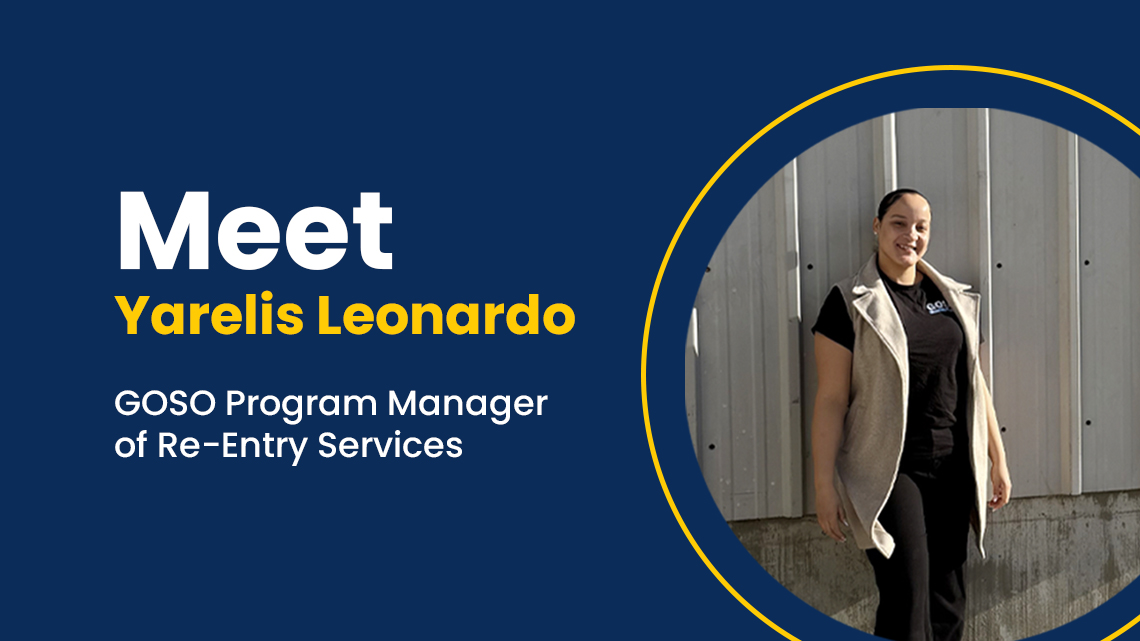GOSO’s reentry model promotes education and vocational training, provides job readiness training and employment assistance, and offers supportive counseling and social services from the day of a participant’s incarceration until they are fully integrated into the community.
Yarelis Leonardo, GOSO’s Program Manager Re-Entry Services, is often the first person a participant interfaces with as they begin at GOSO. She shared some thoughts with us on her role here and why she continues to do this work.

Yarelis Leonardo at the Robert N. Davoren Center (RNDC), a unit on Rikers Island
“
As the Manager of Reentry Services at GOSO, my role is both deeply personal and profoundly impactful. I work directly with incarcerated youth on Rikers Island, ages 16 to 24, who have been directly impacted by the criminal justice system. My primary responsibility is to provide them with comprehensive, individualized support as they navigate the challenging transition from incarceration to society. Each young person I work with receives a personalized transition plan that is tailored to their unique strengths, challenges, and aspirations. I focus on developing specific, actionable strategies that empower them to reintegrate successfully, overcome barriers, and ultimately build a future free of incarceration.In addition to providing direct support, I advocate for each participant in various legal settings. I work closely with attorneys, parole boards, probation officers, and other key stakeholders to advocate for alternatives to incarceration (ATIs), ensuring that the young people I serve are given every opportunity to succeed. I chose this career because of my personal connection to the struggles many young people face. Growing up in Harlem, NY, I witnessed firsthand the challenges adolescents encounter when trying to make positive decisions amidst limited resources and systemic obstacles. I understand the daily battles that youth from underserved communities face when navigating their environments, and I know that many are simply caught in cycles that are difficult to break. However, I also believe with every fiber of my being that young people can change, grow, and rehabilitate. They just need the right support, guidance, and opportunities to make that happen.
This belief is the foundation of why I am so passionate about my work. To me, success for one of my incarcerated participants is about seeing them turn their life around. Success is not just about meeting goals while incarcerated but about maintaining that growth once they are released. Achieving a successful transition back into society, especially from a vulnerable place like Rikers Island, is a testament to their resilience and the effectiveness of the support and strategies we’ve developed together. One of the most harmful misconceptions about incarcerated youth is the belief that they are inherently “bad” or beyond redemption. This narrative is not only inaccurate, but it also disregards the deep-rooted issues that many of these young people face, including trauma, poverty, and a lack of access to positive role models and opportunities. Many of these youth are products of environments that never gave them the tools to make better choices, yet they still possess the potential for growth and rehabilitation. I feel that I am making the biggest impact when I am able to walk alongside a young person through their journey of transformation.
The most rewarding moments in my role are when I see them shift from a place of hopelessness to a place of possibility. There is nothing more powerful than watching someone who has been written off by society embrace their potential and begin to create a new narrative for their life. When this happens, I know that I am doing the work I was meant to do—helping to break the cycle of incarceration and helping these young people build a future full of promise.
“
Learn more about GOSO’s approach here.

